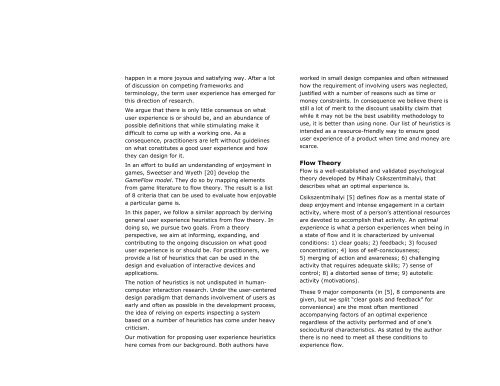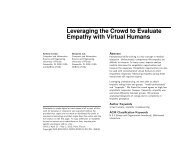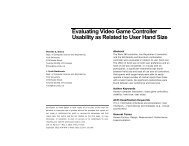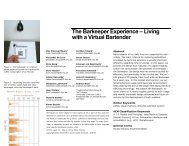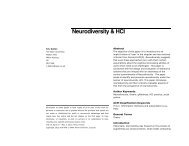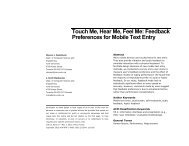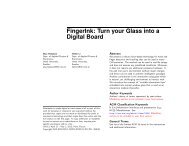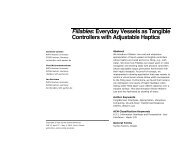10 Heuristics for an Optimal User Experience - alt.chi 2013
10 Heuristics for an Optimal User Experience - alt.chi 2013
10 Heuristics for an Optimal User Experience - alt.chi 2013
You also want an ePaper? Increase the reach of your titles
YUMPU automatically turns print PDFs into web optimized ePapers that Google loves.
happen in a more joyous <strong>an</strong>d satisfying way. After a lot<br />
of discussion on competing frameworks <strong>an</strong>d<br />
terminology, the term user experience has emerged <strong>for</strong><br />
this direction of research.<br />
We argue that there is only little consensus on what<br />
user experience is or should be, <strong>an</strong>d <strong>an</strong> abund<strong>an</strong>ce of<br />
possible definitions that while stimulating make it<br />
difficult to come up with a working one. As a<br />
consequence, practitioners are left without guidelines<br />
on what constitutes a good user experience <strong>an</strong>d how<br />
they c<strong>an</strong> design <strong>for</strong> it.<br />
In <strong>an</strong> ef<strong>for</strong>t to build <strong>an</strong> underst<strong>an</strong>ding of enjoyment in<br />
games, Sweetser <strong>an</strong>d Wyeth [20] develop the<br />
GameFlow model. They do so by mapping elements<br />
from game literature to flow theory. The result is a list<br />
of 8 criteria that c<strong>an</strong> be used to evaluate how enjoyable<br />
a particular game is.<br />
In this paper, we follow a similar approach by deriving<br />
general user experience heuristics from flow theory. In<br />
doing so, we pursue two goals. From a theory<br />
perspective, we aim at in<strong>for</strong>ming, exp<strong>an</strong>ding, <strong>an</strong>d<br />
contributing to the ongoing discussion on what good<br />
user experience is or should be. For practitioners, we<br />
provide a list of heuristics that c<strong>an</strong> be used in the<br />
design <strong>an</strong>d evaluation of interactive devices <strong>an</strong>d<br />
applications.<br />
The notion of heuristics is not undisputed in hum<strong>an</strong>computer<br />
interaction research. Under the user-centered<br />
design paradigm that dem<strong>an</strong>ds involvement of users as<br />
early <strong>an</strong>d often as possible in the development process,<br />
the idea of relying on experts inspecting a system<br />
based on a number of heuristics has come under heavy<br />
criticism.<br />
Our motivation <strong>for</strong> proposing user experience heuristics<br />
here comes from our background. Both authors have<br />
worked in small design comp<strong>an</strong>ies <strong>an</strong>d often witnessed<br />
how the requirement of involving users was neglected,<br />
justified with a number of reasons such as time or<br />
money constraints. In consequence we believe there is<br />
still a lot of merit to the discount usability claim that<br />
while it may not be the best usability methodology to<br />
use, it is better th<strong>an</strong> using none. Our list of heuristics is<br />
intended as a resource-friendly way to ensure good<br />
user experience of a product when time <strong>an</strong>d money are<br />
scarce.<br />
Flow Theory<br />
Flow is a well-established <strong>an</strong>d validated psychological<br />
theory developed by Mihaly Csikszentmihalyi, that<br />
describes what <strong>an</strong> optimal experience is.<br />
Csikszentmihalyi [5] defines flow as a mental state of<br />
deep enjoyment <strong>an</strong>d intense engagement in a certain<br />
activity, where most of a person’s attentional resources<br />
are devoted to accomplish that activity. An optimal<br />
experience is what a person experiences when being in<br />
a state of flow <strong>an</strong>d it is characterized by universal<br />
conditions: 1) clear goals; 2) feedback; 3) focused<br />
concentration; 4) loss of self-consciousness;<br />
5) merging of action <strong>an</strong>d awareness; 6) challenging<br />
activity that requires adequate skills; 7) sense of<br />
control; 8) a distorted sense of time; 9) autotelic<br />
activity (motivations).<br />
These 9 major components (in [5], 8 components are<br />
given, but we split “clear goals <strong>an</strong>d feedback” <strong>for</strong><br />
convenience) are the most often mentioned<br />
accomp<strong>an</strong>ying factors of <strong>an</strong> optimal experience<br />
regardless of the activity per<strong>for</strong>med <strong>an</strong>d of one’s<br />
sociocultural characteristics. As stated by the author<br />
there is no need to meet all these conditions to<br />
experience flow.


